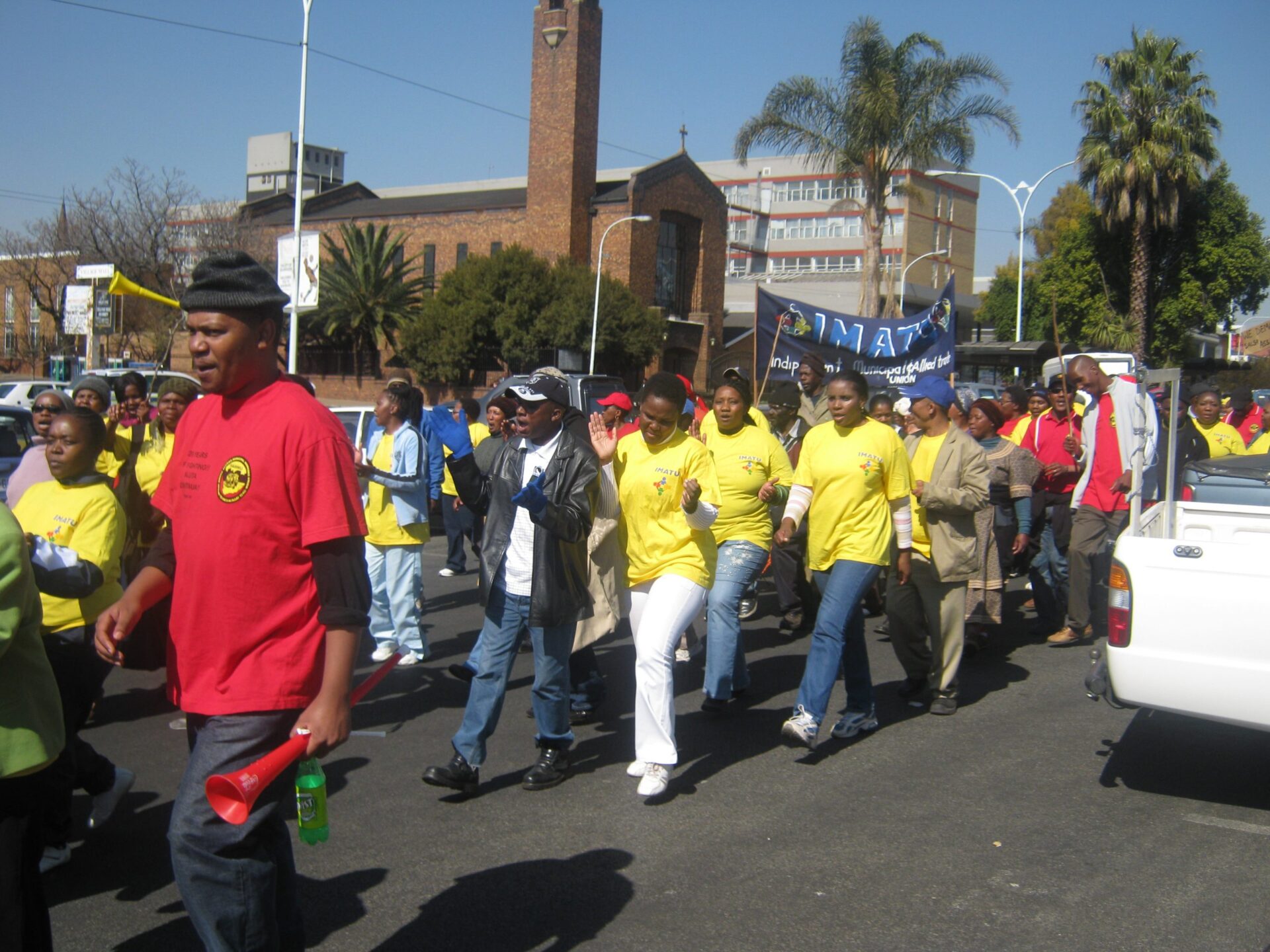by Michael Blake
Two decades ago, virtually all workers in the municipal sphere were permanent employees, directly employed by municipalities. Today this category makes up only half of workers.
Many are now employed by commercialised and corporatized municipal entities. Municipalities also oversee low-paid, short-term EPWP and other community-based programmes; and employ volunteers who do municipal work without remuneration.
However, the employees of outsourced private companies, contracted to municipalities, make up an ever growing proportion of all ‘municipal’ workers.
Today permanently employed municipal workers – typically union members and protected by collective bargaining agreements – are outnumbered by a growing neoliberalised super-exploited category of employee.
Neoliberal management
The ANC government is responsible not just for the neoliberal restructuring of the municipal workforce, but also for introducing a market-based, business-oriented ‘New Public Management regime’ into the local government sphere to contain budget costs and ensure greater ‘efficiency’.
Neoliberal ‘democratic transformation’, including the massive expansion of outsourcing, has involved frequent structural and organisational change. The upshot has been strained relations between workers and management, poor planning outcomes and a lowering of public accountability.
Over the years, workers have witnessed creeping corruption, maladministration and mismanagement and a growing sense of failure within municipalities.
Impact on workforce
For the workforce, neoliberal restructuring has meant: weaker job security; downward pressure on wages; growing work stress; lower staff morale; the erosion of health and safety standards; and a significant proportion of workers with no benefits.
The cost- and efficiency-driven dispensation also led to severe staff shortages, including health care personnel, engineers, technicians, artisans, firefighters/emergency workers, librarians; and a lack or poor maintenance of equipment and facilities. High vacancy rates now also combine with high staff turnover and absenteeism.
These trends have weakened workers’ democratic control over workplace issues; undermined a public sector ethos; and created new difficulties for the unions.
The range of neoliberal changes has led to mounting worker dissatisfaction across departments.
Union track record
Of the 250 000 workers employed directly by municipalities (not including 40-50 000 vacancies), over 70% are unionised; today the South African Municipal Worker Union (Samwu) members make up possibly half and the Independent Municipal and Allied Trade Union (Imatu) close to a third of the workforce.
Samwu has a long track-record of resistance to privatisation, commercialisation, corporatisation, outsourcing and labour broking, including:
·consistent calls for permanent employment and direct employment by municipalities for all workers
·the inclusion of all workers in the sector, both public and private, in the South African Local Government Bargaining Council.
·recruitment of all workers, both public and private, into the union.
Imatu has similar positions.
Angry words…
The Samwu leadership has vacillated between threats of militant mass action and bending to the will of the neoliberal ANC.
Neoliberalism in the municipal sphere was initiated by way of the hard-line efforts of the South African Local Government Association (Salga) and the private companies operating in the sector. Over the years, worker resistance was met with threats, harassment, victimisation and the suspension and dismissal of worker leaders.
In response to the bosses’ harsh actions, in 2011 a Samwu resolution branded Salga as “the enemy”; in 2013 it accused Salga of “destroying local government and Samwu”; and in 2015 it declared that “Salga behaves like a pre-1994 employer”.
Kiss and make up
Despite these angry words and the threat of strike action in 2011 and 2015 and even withdrawal of electoral support for the ANC in 2011, the Samwu leadership proceeded to kiss and make up before the elections.
Even though workers’ pockets were hit by food inflation and mounting household debt, their basic demands – for a 15-18% wage increase, for a minimum wage (R8 000 – 9 000) and a housing allowance (R1 500 – 1 800) for all workers – were sacrificed.
Municipal bosses added their voices for wage austerity. Adding insult to injury, Salga warned that Samwu’s wage demands would result in reduced municipal services to communities.
While the Treasury and Salga imposed austerity wages on municipal workers, the ANC government has seen fit to pay top municipal politicians and officials outrageously high salaries. Last year Salga’s CEO received a 36% increase, bringing his annual salary to R4,4 million.
Even worse, immediately after the 2011 elections, in breach of an agreement between Salga and Samwu/Imatu, President Zuma signed the Municipal Systems Amendment Bill that undermined collective bargaining by granting the Minister of Cooperative Governance and Traditional Affairs the power to intervene in wage negotiations.
Union failings
In the face of neoliberal attacks, Samwu has struggled to maintain its membership and has been wracked by leadership strife. This has resulted in the dismissal of key provincial leaders, a court battle and the establishment of at least two new rival unions in the municipal sector.
The truth is that neither Samwu nor Imatu has blocked the neoliberalisation of the workforce; the unions have also failed recruit new insecure workers in significant numbers; nor have the municipal unions built real ties of solidarity with protesting communities.
At the same time, insecure rank-and-file workers, in many cases without union support, have increasingly resorted to direct or wild-cat actions to fight for permanent positions, higher wages and for the same benefits and conditions of service enjoyed by workers protected by bargaining agreements.
United struggle
With a common set of interests and enemies, there is an objective basis for unity in action among all municipal workers, as well as between them and suffering communities.
The majority of workers in the sector are the bread-winners of poor families, they live in the same homes and communities, they are common victims of bad housing, poor quality services and inadequate infrastructure and facilities.
In the next period, no effort should be spared to unleash the combined might of municipal workers and communities, in a common struggle against neoliberal capitalist ANC and DA administrations throughout the country.
